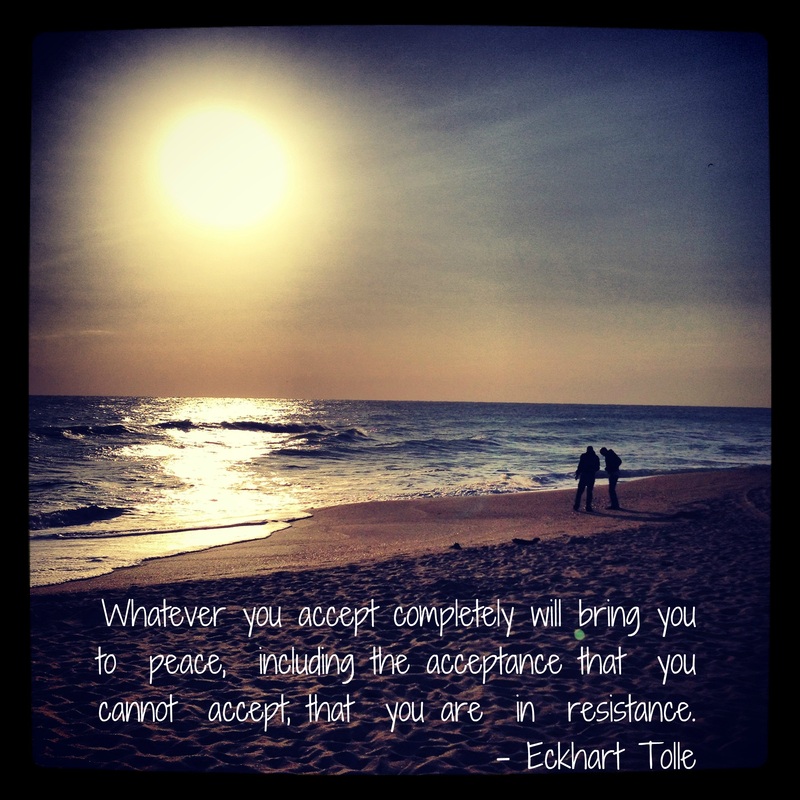| A lot of the time, I suck at being present. Not always, but a lot of the time. At work, when I'm with a patient, I can be really good at practicing presence. I think that's actually one of my strongest clinical skills. And it works; people get better in the presence of presence. But when I'm off the floor and at my desk, or when I'm driving in or heading out, I lose that focus. And it's funny: this yoga blog business has been my latest big distraction from the moment, despite my intention to make it the opposite of that. It's my new crush. I think about it all the time and feel giddy to get home and spend a little time with it. Instead of focusing on the interesting details of my day while I'm living them, I find myself daydreaming about how they might later turn into meaningful metaphor or anecdote. Which really pisses me off. This is how it goes, in a nutshell: [insert interesting interaction | |

here] Oh wow, wasn't that interesting. Huh. It reminds me of that thing I heard in my Oprah meditation last night. And I bet there's some connection I could make between this situation and my sore left ankle. I wonder if there's a quote on pinterest that could sum this up. I should jot it down. If I could just get back to my desk for a pen and some paper. I wish I didn't have that late meeting today so I could go home and put these pieces together in a post…
I'm sure you caught that. I sucked myself straight out of some interesting moment and into my lonely, needy brain. And then I promptly wished myself right out of gratitude, right out of living my life. Now I wish I didn't do that; it really pisses me off. Which brings me to the macro issue, the thing I do that perpetuates the problem: I call the problem a problem and I get all pissy about it. That's what I do. And then I'm stuck. I'm tense, I'm annoyed, I'm stuck. I reprimand myself and develop a plan for penance. Be here now, dammit! Do some deep breathing, feel the aliveness in your hands, notice the sky or something! Sometimes it works for a bit, but it's really just trading one fear for another. I move from fear of presence (which could read fear of forgetting, fear of losing control, fear of being fully available, whatever) to fear of being imperfect--my foundational fear.
Enter Yin Yoga, tonight's practice, a series of asanas (that's yoga for poses) held for three to five minutes at a time. It's a quiet, gentle practice that works deep into tissue. It's called Yin Yoga because it's supposed to compliment the more common, muscle-building "yang" practices by working deep into the bones and ligaments. Tonight, it's candlelit. The music is peaceful and soothing, the room is warm and full. Not metaphorically full. Really, really full, and I am only just barely on time. Which means I must make a third row of mats all by myself, front and center. It's a recipe for sharp, unhelpful mind chatter in the midst of so much softness.
We start by focusing on our breath. Or I should say, I'm sure that everyone else in the room easily starts by focusing on their breath. I, on the other hand, start by having a serious talk with myself. Self, I say, shut the hell up. None of this "I'm so stressed out, I'm in the front row by myself" nonsense. None of this, "There's not even supposed to be a third row! Should I have scooted into the second row somehow? Oh dear, literally every single person in this room can see me." I was very stern and serious. Focus on your breath! Right now! Do it!
That didn't work. Of course not. I stayed stuck in that tension between fears for a few poses. And then the instructor said something magical, said the perfect thing: Sometimes resisting the surrender feels more uncomfortable than the surrender. YES! And okay, I won't lie, I had to quickly resist the urge to hop right out of frog pose and jot that down. But instead of attaching to the words and panicking that they might leave me, I just simply lived them. My frog posed shins slid apart an inch or so. Ahhhh. And what's more, I befriended again my silly, neurotic brain, my well-intentioned, sweet little self. Of course you feel nervous, self! That's completely understandable. I still love you and I'm proud of you here in frog pose, sinking down another quarter inch. Surrender. Ahhhh.
I'm sure you caught that. I sucked myself straight out of some interesting moment and into my lonely, needy brain. And then I promptly wished myself right out of gratitude, right out of living my life. Now I wish I didn't do that; it really pisses me off. Which brings me to the macro issue, the thing I do that perpetuates the problem: I call the problem a problem and I get all pissy about it. That's what I do. And then I'm stuck. I'm tense, I'm annoyed, I'm stuck. I reprimand myself and develop a plan for penance. Be here now, dammit! Do some deep breathing, feel the aliveness in your hands, notice the sky or something! Sometimes it works for a bit, but it's really just trading one fear for another. I move from fear of presence (which could read fear of forgetting, fear of losing control, fear of being fully available, whatever) to fear of being imperfect--my foundational fear.
Enter Yin Yoga, tonight's practice, a series of asanas (that's yoga for poses) held for three to five minutes at a time. It's a quiet, gentle practice that works deep into tissue. It's called Yin Yoga because it's supposed to compliment the more common, muscle-building "yang" practices by working deep into the bones and ligaments. Tonight, it's candlelit. The music is peaceful and soothing, the room is warm and full. Not metaphorically full. Really, really full, and I am only just barely on time. Which means I must make a third row of mats all by myself, front and center. It's a recipe for sharp, unhelpful mind chatter in the midst of so much softness.
We start by focusing on our breath. Or I should say, I'm sure that everyone else in the room easily starts by focusing on their breath. I, on the other hand, start by having a serious talk with myself. Self, I say, shut the hell up. None of this "I'm so stressed out, I'm in the front row by myself" nonsense. None of this, "There's not even supposed to be a third row! Should I have scooted into the second row somehow? Oh dear, literally every single person in this room can see me." I was very stern and serious. Focus on your breath! Right now! Do it!
That didn't work. Of course not. I stayed stuck in that tension between fears for a few poses. And then the instructor said something magical, said the perfect thing: Sometimes resisting the surrender feels more uncomfortable than the surrender. YES! And okay, I won't lie, I had to quickly resist the urge to hop right out of frog pose and jot that down. But instead of attaching to the words and panicking that they might leave me, I just simply lived them. My frog posed shins slid apart an inch or so. Ahhhh. And what's more, I befriended again my silly, neurotic brain, my well-intentioned, sweet little self. Of course you feel nervous, self! That's completely understandable. I still love you and I'm proud of you here in frog pose, sinking down another quarter inch. Surrender. Ahhhh.
| The thoughts didn't leave my brain miraculously after that, of course. And I didn't forget about the rows of eyes that might be on me. But it didn't matter. That was just what the present moment held. Some silly thoughts, some attachments, some worry, some fear. I let go of my ideas about how the moment should be, and about how I should be in the moment, and I just sat there in it, busy-brained or not. It's been my consistent experience that change happens naturally when I stop resisting reality. Not when I problem solve it to a pulp or reprimand it into submission, but when I'm finally able to open up to all of it with compassion and acceptance. That's when things fall into place. In my training as a social worker, I was exposed to a helpful metaphor for this idea. If you're |
stuck in quicksand, the more you struggle, the more you sink. The way to move out of quicksand is to stretch out on it, to actually increase the amount of surface-area contact your body has with it in order to flow to the edge and roll out. This was a controversial concept among my colleagues in grad school, some of whom felt that only effort could create change, and that suggesting acceptance as a strategy would promote laziness. If you're familiar at all with my Behavioral Psychology colleagues, you can predict that they had the data to back up their opposition to the idea that surrender could lead to change. I was in the small camp that agreed with the concept, not necessarily because of the research, mostly just because it felt true.
Here I submit into evidence Day Four Savasana. For it is today, after a practice full of surrendering over and over to a series of distracting thoughts, in a front row all by myself, that I fell for the first time deeply, thoughtlessly asleep.
Here I submit into evidence Day Four Savasana. For it is today, after a practice full of surrendering over and over to a series of distracting thoughts, in a front row all by myself, that I fell for the first time deeply, thoughtlessly asleep.
Photo Credits: Me. Please use responsibly :)

 RSS Feed
RSS Feed